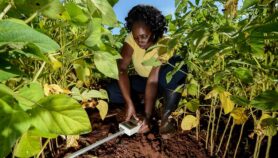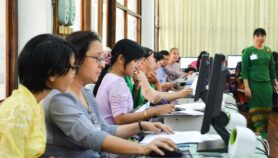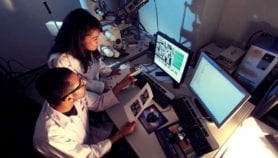Send to a friend
The details you provide on this page will not be used to send unsolicited email, and will not be sold to a 3rd party. See privacy policy.
[DOHA, QATAR] Gulf states in the Middle East are pouring millions of dollars into a scientific renaissance — yet journalists are failing to give these initiatives any critical assessment, leading science journalists in the region have said.
Abu Dhabi, Dubai, Qatar and Saudi Arabia are all making huge investments in higher education, science and technology.
Yet questions such as whether these initiatives will actually help the poorest remain unasked, a plenary session at the 7th World Conference of Science Journalists in Qatar (27–29 June) heard today.
"The Middle East is now a very attractive place to report from about science," said Waleed Al-Shobakky, a science writer based in Qatar. "But journalists should have a critical sense to get a balanced story."
"Journalists should avoid stereotypical stories about oil money buying scientific research partnerships," he told SciDev.Net. Instead of being astonished by the money spent or the number of research papers published, they should try to report in-depth on details "to see how and to what extent this could actually help in developing the region".
Uncritical reporting is also an issue in other parts of the Middle East, the meeting heard. In Iran, where the output of published papers has soared, journalists were criticised for not seeking to understand the reasons for the increase.
Much of the research propelling this rise is related to just a few branches of science like physics, mathematics, and nuclear research, said Homayoun Kheyri, a scientist and freelance reporter for the BBC World Service. If journalists looked at the details they would find that "this progress is accidental and not programmed" — this may be a sign of a defect that should be reported on.
Earlier in the day the meeting heard about an example of Gulf State generosity towards science. Mohamed Fathy Saoud, president of the 15-year old Qatar Foundation, described his country’s vision for research, saying there was "no ceiling to our aspirations".
By 2015 Qatar is planning to be investing 2.8 per cent of its gross domestic product (GDP) in science and technology research.
Qatar has ambitious measures in place to attract tens of thousands of Arab scientists to work in the country or to collaborate with it from abroad, in an attempt to reverse the brain drain.
It worked with the Texas A&M University — "the number one school in the United States in petroleum engineering" to come to the country and set up a branch campus, Saoud said.
Over the next two years, the foundation is also hoping to attract 3,000 researchers, physicians and medical staff to manage and operate a cluster of medical and research centres.
"This will become the first academic medical centre to be created outside North America to promote care, research from the laboratory to the bedside, and medical education," he said.
In contrast to the journalists’ comments, Egypt’s Nobel laureate Ahmed Zewail earlier told the meeting that journalists should be reporting on success stories. The fact that Qatar was turning itself from a desert into a summit of educational excellence was an example of such a story, he said.
Link to SciDev.Net‘s blog from the World Conference of Science Journalists
See below for a video from the conference:













